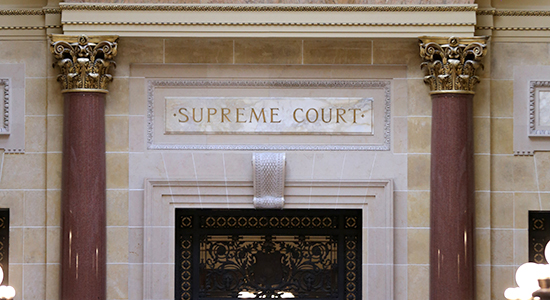
Dec. 19, 2016 – The Wisconsin Supreme Court will hear eight cases in January, including an appeal by a young man who argues that his criminal record should be expunged even though he was cited for underage drinking while on probation.
In Wisconsin, an individual can request expungement of a criminal record for minor crimes committed when the individual was under the age of 25. The individual must successfully complete the sentence and, if applicable, satisfy all conditions of probation.
In this case, a sentencing judge ruled that Lazaro Ozuna’s convictions for criminal damage to property and disorderly conduct could be automatically expunged if he successfully completed his sentence, including a one-year period of probation.
Ozuna could not drink alcohol as a condition of his probation. The Department of Corrections sent the probation discharge paperwork to the court noting that Ozuna “successfully completed” his probation but failed to comply with the no alcohol condition.
The circuit court denied the expungement, based on the citation for underage drinking. A state appeals court upheld the denial, rejecting Ozuna’s argument that a probationer can violate a condition of probation and still be entitled to automatic expungement.
“Ozuna invites this court to create a new, lower bar with no clear delineation or foundation in the statute,” wrote Appeals Court Judge Brian Hagedorn. “If Ozuna’s lone drinking citation is considered acceptable, how about two? Or three?”
“While grace and mercy are indispensable components of justice, the real tragedy here is that Ozuna found the grace of expungement not worth the price of abstinence from alcohol during probation. That choice was his, and this court finds nothing in the statute granting it liberty to extend a third chance when Ozuna chose to spurn the second.”
Now Ozuna will take his case to the Wisconsin Supreme Court, which will also hear seven other criminal and civil cases in January, noted below.
AllEnergy Corp. v. Trempealeau County Environment & Land Use Committee
Trempealeau County Environment & Land Use Committee denied AllEnergy Corporation’s application for a conditional use permit, and AllEnergy sought judicial review. A circuit court upheld the denial, and an appeals court affirmed.
The application concerned the proposed operation of a non-metallic mine covering 265 acres of agriculturally zoned land in the Town of Arcadia.
AllEnergy submitted the application one month before Trempealeau County adopted a one-year moratorium on non-metallic mines. The courts ruled that the committee’s decision to deny the conditional use permit was supported by substantial evidence.
North Highland Inc. v. Jefferson Machine & Tool Inc.
North Highland alleged that Frederick Wells conspired to breach a fiduciary duty by teaming up with a North Highland employee to form a new company, using trade secrets of North Highland, to compete on a contract with Tyson Foods, Inc.
Ultimately, a circuit court granted Wells’ motion for summary judgment, which argued that North Highland’s claims against Wells were barred by claim preclusion. North Highland had settled with the other defendant, who was dismissed from the case.
An appeals court ruled that “summary judgment is appropriate because North Highland has failed to establish that there is sufficient evidence to support the claim.”
Margaret Pulera v. Town of Richmond
The Wisconsin Court of Appeals certified this case to the Wisconsin Supreme Court to clarify the certiorari filing deadline statute relating to town highway orders.
Margaret Pulera filed certiorari petitions for judicial review of town highway orders. She filed in two counties because the highway borders two counties.
Both circuit courts denied her petition as untimely but applied different interpretations of the certiorari filing deadline statute, Wis. Stat. section 68.13, which requires a party seeking judicial review to petition the court within 30 days of a “final determination.”
“[I]n the context of the highway order process described in Wis. Stat. ch. 82, it is unclear how the certiorari filing deadline of Wis. Stat. § 68.13(1) should be applied,” the certification states, noting other issues associated with the highway order process.
State v. Raymond L. Nieves
Raymond Nieves appealed his conviction for first-degree intentional homicide as a party to a crime and with the use of a dangerous weapon.
An appeals court reversed and remanded for a new trial, concluding that the trial court improperly admitted unreliable and prejudicial hearsay testimony. An appeals panel also ruled that Nieves' trial should have been severed from a co-defendant’s trial.
Vincent Milewski v. Town of Dover
Vincent Milewski, in a lawsuit against the Town of Dover, argued that Wisconsin law on property tax assessments and appeals is unconstitutional. A circuit court dismissed the claims and a state appeals court affirmed. The plaintiffs had refused to let the county’s property value assessor view the interior of their home. The assessor then viewed the home’s exterior and increased the home’s value by more than 12 percent. The plaintiffs seek damages for a deprivation of rights under 42 U.S.C. section 1983.
Scott Smith v. Greg Kleynerman
Scott Smith sued Greg Kleynerman, alleging a breach of a fiduciary duty and intentional misrepresentation. The two were equal 50/50 shareholders of a company.
A jury awarded Smith $499,000 in compensatory damages. The jury also awarded punitive damages for intentional representation, but the circuit court struck the punitive damages as legally inconsistent with the jury’s verdict related to that claim.
The appeals court ruled that the circuit court properly denied Kleynerman’s motion for summary judgment notwithstanding the verdict on the fiduciary duty claim, and properly denied Smith’s post-verdict motion related to intentional misrepresentation.
Waukesha County v. J.W.J
In this case, a petitioner challenges an order that extended his involuntary commitment and an order for continued involuntary medication and treatment. A circuit court upheld Waukesha County’s extension. A state appeals court affirmed.
The petitioner argues that Waukesha County failed to prove by clear and convincing evidence that he is a proper subject for treatment under Wis. Stat. chapter 51.
